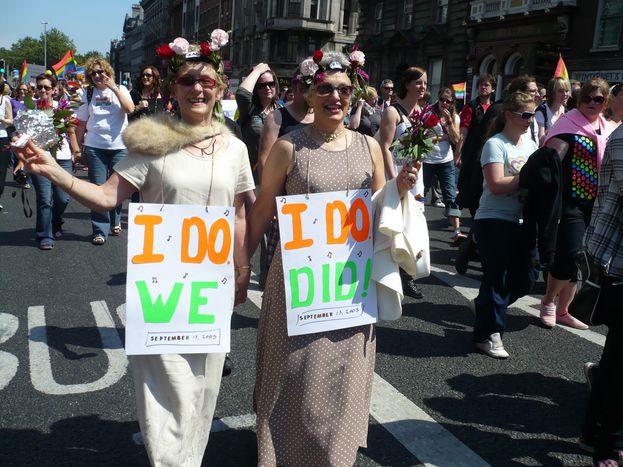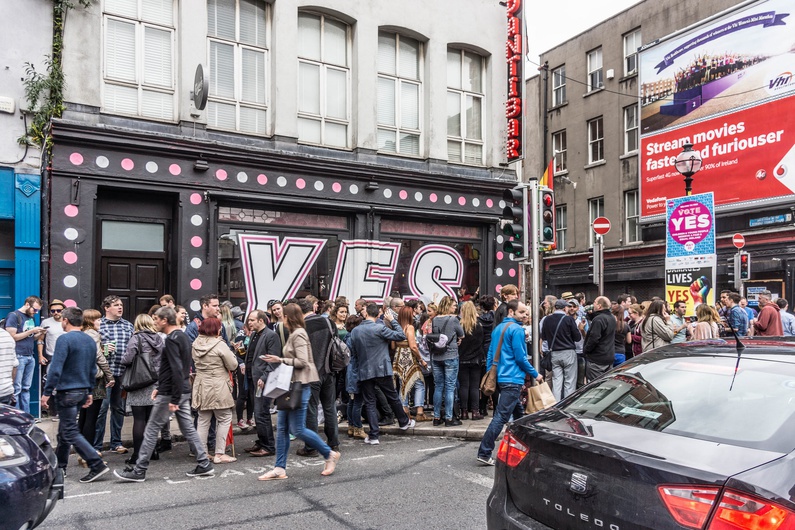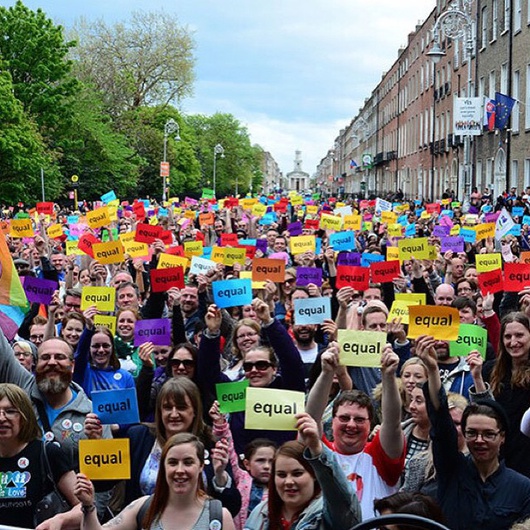
Despite marriage equality, more battles lie ahead for Irish liberalism
Published on
While Ireland decisively accepted marriage equality in last week's referendum, the result highlighted a chasm between the country's Catholic conservatism and youthful social liberalism.
For the latter movement to gain on this victory, there are many more fights to be won in the future.
The 22nd of May has marked another substantial addition to the democratic process in Ireland. No stranger to the popular vote, Ireland has had 10 referendums in as many years, one of the highest rates in Europe.
But getting people fired up about European fiscal compacts and judicial remuneration can be quite a challenge for the Referendum Commission, with many votes in recent years suffering from low public awareness and subsequent turnout.
While the vote to change the candidacy age for the Irish presidency was set to faithfully follow this trend, the vote on marriage equality, which occurred on the same day, was a different matter entirely. Rather than the technicalities of the Irish political process, citizens were voting to enhance the rights of the LGBT community across the country.
 It is rare in Ireland to hear of expatriates coming home for the sake of democratic duty, yet people returned in their droves, and those that were unable to come back expressed their disappointment on social media, and urged others to make the change that they couldn't. It is not hard to see the reason for such heightened levels of passion on both sides of the equality debate. The question of marriage equality belongs to a very special part of Irish democracy - it is a tangible manifestation of the battle between Catholic conservatism and new age liberalism that has flared up over the past 20 years. Among its peers are the question of divorce (successfully legalised in 1995), and the ongoing conflict over the rights of the unborn and use of abortion.
It is rare in Ireland to hear of expatriates coming home for the sake of democratic duty, yet people returned in their droves, and those that were unable to come back expressed their disappointment on social media, and urged others to make the change that they couldn't. It is not hard to see the reason for such heightened levels of passion on both sides of the equality debate. The question of marriage equality belongs to a very special part of Irish democracy - it is a tangible manifestation of the battle between Catholic conservatism and new age liberalism that has flared up over the past 20 years. Among its peers are the question of divorce (successfully legalised in 1995), and the ongoing conflict over the rights of the unborn and use of abortion.
Campaign strength on this issue was very one sided: the Yes camp dominated in terms of funding and volunteer power, with widespread coverage attesting to this fact. They also had a generous national and international cohort of celebrity supporters, ranging from former Irish president Mary McAleese to British charismatic polymath Stephen Fry. But nobody was ringing victory bells before referendum day. The UK election earlier this month generated a great deal of scepticism around polling data, and the Irish people became ever more aware of the shy no vote and the impact this may have.
There were, of course, more vocal No campaigners, one such being senator Ronan Mullen. At a recent "No Debate", held in University College Dublin (UCD), Senator Mullen homed in on the potential problems that a yes vote may have for children of gay couples, stating that the "main argument of the no vote is the central right of children." The main concerns that he voiced were the status of sperm and egg donations, the use of surrogate mothers, and the innate deficiency of a homosexual family unit. Thus, the mantra of the night was "all things equal, the optimum family unit is a father and a mother."
 This sort of rhetoric would of course draw mixed responses from a politically-charged audience, but the near-equal division of opinions that were expressed at the debate, particularly in such a liberal bastion like UCD, demonstrated a cleavage that did not correlate to the polls putting the yes vote between 70% and over. With the final results being 62.06% yes against 37.94% no, the referendum has shown that there is still a substantial divide in Irish society that needs to be addressed if further reform is to occur.
This sort of rhetoric would of course draw mixed responses from a politically-charged audience, but the near-equal division of opinions that were expressed at the debate, particularly in such a liberal bastion like UCD, demonstrated a cleavage that did not correlate to the polls putting the yes vote between 70% and over. With the final results being 62.06% yes against 37.94% no, the referendum has shown that there is still a substantial divide in Irish society that needs to be addressed if further reform is to occur.
In voting yes, Ireland has become the first country in the world to legalise gay marriage by popular vote. This will go some way to strengthen Ireland's image as a modern and socially tolerant state, an image that many see as tarnished by the ongoing abortion debate and continuing Catholic influence.
While the church has experienced a marked waning in recent years, its contribution to the Irish constitution (bunreacht na hEireann) of 1937 is still felt today, from restrictive blasphemy laws to affirming a woman's role in the home. In voting yes on Friday, Ireland has chosen to distance itself from the traditions of the church, and has pursued a more liberal approach to societal change. But while this significant hurdle has been overcome, Ireland still has some way to go before it can consider itself a paragon of liberal values.



